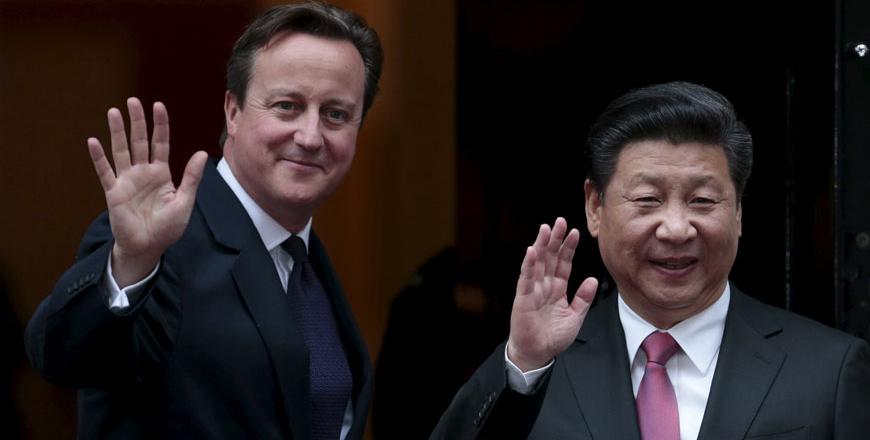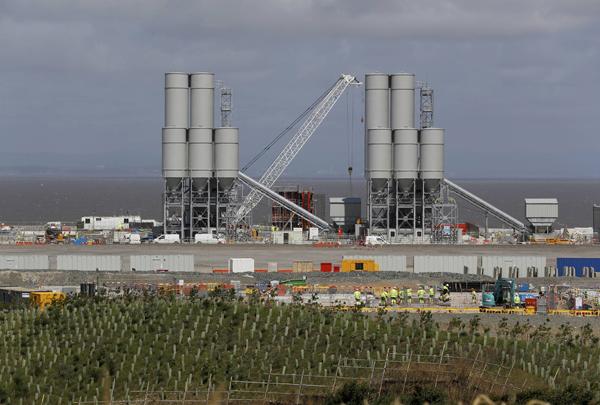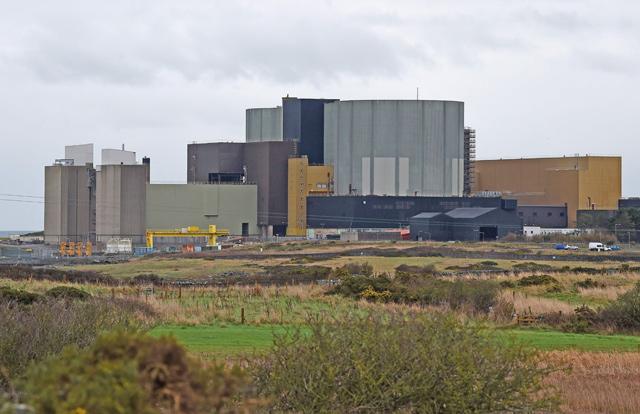You are here
China takes stake in UK nuclear project on Xi visit
By AFP - Oct 21,2015 - Last updated at Oct 21,2015

China’s President Xi Jinping is welcomed by Britain’s Prime Minister David Cameron to 10 Downing Street in central London, Britain, on Wednesday (Reuters photo)
LONDON — China vowed Wednesday to take a one-third stake in Britain's first nuclear power plant in decades in a project led by French energy giant EDF, on the second day of President Xi Jinping's business-themed state visit.
EDF announced the blockbuster deal, signed in the presence of Xi and British Prime Minister David Cameron, in a statement as London rolled out the red carpet to woo Chinese investors.
The agreement for the gigantic project, whose construction costs total £18 billion ($28 billion, 24.5 billion euros), is expected to be finalised in the next few weeks.
"We're signing an historic deal to build the Hinkley nuclear power station," Cameron said at a joint press conference with Xi at Downing Street.
The French utility will construct two European Pressurised Reactors, a third-generation nuclear reactor design considered the most advanced and safest in the world, at the Hinkley Point C plant in Somerset, southwestern England.
Beijing's state-run China General Nuclear Corporation (CGN) will finance £6 billion of the construction costs, with EDF providing the remainder, according to the statement.
"We have all the conditions now in place, subject to final investment approval in the next few weeks, to go ahead with the project," said Vincent de Rivaz, head of EDF's British division, in a telephone conference to journalists.
EDF is the lead contractor with an initial stake of 66.5 per cent — which could fall to 50 per cent if other investors are brought on board — while CGN has the remaining 33.5 per cent.
The Hinkley facility will not be operational until 2025 — two years later than originally planned when the deal was first unveiled two years ago.
The pair also reached agreement on a partnership to develop nuclear power stations at Sizewell, on the eastern English coast in Suffolk, and at Bradwell in Essex, southeastern England.
Britain has placed nuclear at the core of its low-carbon energy policy, in contrast to eurozone powerhouse Germany, which has pledged to phase out nuclear power after Japan's 2011 Fukushima disaster.
"Today's announcement means that Hinkley Point is going ahead," added de Rivaz.
"That is good news. Good news for the UK and good news for customers, jobs, industries. It will be one of the largest investments ever in British history and it will provide valuable low carbon electricity for decades to come."
The Hinkley project would create over 25,000 jobs and power six million homes, according to Britain's Department of Energy and Climate Change.
"Entering the UK's nuclear market marks a new phase for CGN," added CGN chairman He Yu.
High costs?
British opponents of Hinkley complain about the high building costs and the time it will take to generate power, as well as the guaranteed agreed electricity price of £92 per megawatt hour over 35 years.
"Hinkley Point C is likely to be the most expensive power station ever built anywhere," said Lisa Nandy, energy and climate change spokeswoman for the opposition Labour Party.
"I'm deeply concerned about the costs for households, and particularly vulnerable groups like pensioners."
Hinkley aims to provide 7 per cent of Britain's total power generation needs.
Deals totalling more than £30 billion ($46.4 billion, 40.7 billion euros) are to be signed during Xi's four-day visit that began Tuesday.
These include a £50 million deal between carmaker Aston Martin and China Equity to develop a low-emission sports car, media deals to distribute BBC and Chinese entertainment, and for London's Victoria and Albert Museum to open a design museum in the city of Shenzhen.
Chinese automaker Geely, which produces London's iconic black taxis, has also announced a £50 million investment to launch zero emission-capable cabs.
Human rights protests
On the first day of the trip on Tuesday about 200 demonstrators booed Xi's journey to Buckingham Palace with Queen Elizabeth II in a gilded carriage in protest over Beijing's humans rights record.
Cameron has been accused by some observers of kowtowing to China in a bid for investment and the visit comes at a particularly sensitive time as thousands of jobs are being cut in Britain's steel sector, partly due to subsidised Chinese steel imports.
Leading Hong Kong pro-democracy activist Joshua Wong, 19, who attended a protest against Xi, told AFP that the prospect of Chinese cash "has blinded the eyes of David Cameron".
Related Articles
LONDON — The head of EDF Energy has urged the British government to approve the Hinkley Point C nuclear power project, an explicit appeal by
PARIS — French electricity group EDF on Wednesday said completion of a new nuclear power plant in England would be delayed by six months and
LONDON — Japan’s Hitachi on Wednesday scrapped its multi-billion-pound nuclear plant project in Wales in face of the deteriorating investmen


















